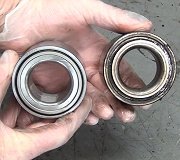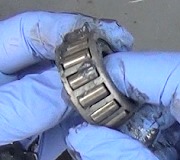No anti-seize compound. Use of that around wheel studs and CV joints will get a mechanic fired.
I'm happy to read you understand the importance of torquing the axle nuts. That is what holds the wheel bearings together. One note though; many competent do-it-yourselfers set the vehicle down on the tires to hold the axle shaft from spinning so they can tighten the axle nut. By that time the damage has been done. There must never be any vehicle weight on that bearing unless it has been tightened to specs. Doing so will instantly make it noisy and sound like an airplane engine. An easier way is to stick a punch or screwdriver into one of the cooling slots in the brake rotor, then tighten the axle nut.
No lubricant is required. These nuts never get rusted so tight they can't be removed next time. Also, any lubricant on the threads will not make a significant difference in the drag on the threads as the nut is tightened.
If you have a stamped steel cage with slots for a cotter pin, those nuts can be reused. If you have the style shown below, those are usually a one-time-use nut. You will get a new one with the wheel bearing. They're called, "torque-to-yield" nuts. The threads peel or stretch a little making torque values invalid for the next use. They will not develop the needed clamping force when tightened to specs.
Image (Click to make bigger)
Thursday, March 30th, 2023 AT 1:04 PM




